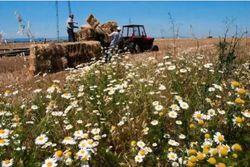The National | 1 November

by Caline Malek
ABU DHABI // A tranche of Serbian farmland bought by an Abu Dhabi firm should be providing a substantial amount of the UAE's food within the next five years.
In a Dh1.4bn project, Al Dahra Agricultural Company plans to use the 20,000 hectares to grow hay, animal feed, wheat, corn and alfalfa.
"The land there is fertile and the cultivated crops are partly needed in the UAE," said Khadim Al Darei, Al Dahra's vice chairman and managing director.
It could take up to five years for the land to reach its full potential, but he has high hopes.
"[Serbians'] technical knowledge is well-known in terms of farming. They are historically famous in agriculture with qualitative production."
In the past year, the company has bought a 1,000-hectare farm in Namibia's southern region of Karas, which is expected to produce about 2,500 tonnes of dates a year. The company has also acquired 15 square kilometres of land in Morocco to grow olives for oil and it harvests potatoes in Egypt. A rice project in Pakistan is expected to yield 100,000 tonnes this year.
The Serbian project will start in earnest next year, and substantial production should follow a couple of years later. "Normally, you start gradually in order to reach the entire land," said Mr Al Darei.
However, that piece of land will only produce a small portion of the UAE's food. Al Dahra is hoping, though, to get more from technical partnerships with other farms in the country, which it will equip with irrigation systems in exchange for a share of the crops.
"We have professional farming management and qualified teams in terms of irrigation systems to equip the Serbian farms. So they will give us crops in return," said Mr Al Darei.
Investing in Europe removes a key problem that has held back projects in some developing countries: infrastructure.
"Infrastructure is the single biggest problem in investing in land in Africa and some parts of Asia," said Dr Deborah Schlichting, an economist at Solvus Economics in Abu Dhabi. "You might get a good deal on the land but the state of the infrastructure is step one of many."
Serbia is just one of a number of countries Al Dahra plans to invest in. "Serbia is in the heart of our future plans for expansion [in] central Europe, including Romania," said Mr Al Darei.
"We will also invest in farmland in the southern hemisphere, including Namibia, Southern Africa, South America, Argentina and Brazil in the future. That way we can have crops all year round.
"Our ambition is for 50 per cent of our trading activities to be in-house farmed. This will help us control the availability of products for our customers and for food security in the UAE."

Al Dahra Agricultural Company plans to use the 20,000 hectares which it has bought in Serbia to grow hay, animal feed, wheat, corn and alfalfa from next year. (Photo: AFP)
by Caline Malek
ABU DHABI // A tranche of Serbian farmland bought by an Abu Dhabi firm should be providing a substantial amount of the UAE's food within the next five years.
In a Dh1.4bn project, Al Dahra Agricultural Company plans to use the 20,000 hectares to grow hay, animal feed, wheat, corn and alfalfa.
"The land there is fertile and the cultivated crops are partly needed in the UAE," said Khadim Al Darei, Al Dahra's vice chairman and managing director.
It could take up to five years for the land to reach its full potential, but he has high hopes.
"[Serbians'] technical knowledge is well-known in terms of farming. They are historically famous in agriculture with qualitative production."
In the past year, the company has bought a 1,000-hectare farm in Namibia's southern region of Karas, which is expected to produce about 2,500 tonnes of dates a year. The company has also acquired 15 square kilometres of land in Morocco to grow olives for oil and it harvests potatoes in Egypt. A rice project in Pakistan is expected to yield 100,000 tonnes this year.
The Serbian project will start in earnest next year, and substantial production should follow a couple of years later. "Normally, you start gradually in order to reach the entire land," said Mr Al Darei.
However, that piece of land will only produce a small portion of the UAE's food. Al Dahra is hoping, though, to get more from technical partnerships with other farms in the country, which it will equip with irrigation systems in exchange for a share of the crops.
"We have professional farming management and qualified teams in terms of irrigation systems to equip the Serbian farms. So they will give us crops in return," said Mr Al Darei.
Investing in Europe removes a key problem that has held back projects in some developing countries: infrastructure.
"Infrastructure is the single biggest problem in investing in land in Africa and some parts of Asia," said Dr Deborah Schlichting, an economist at Solvus Economics in Abu Dhabi. "You might get a good deal on the land but the state of the infrastructure is step one of many."
Serbia is just one of a number of countries Al Dahra plans to invest in. "Serbia is in the heart of our future plans for expansion [in] central Europe, including Romania," said Mr Al Darei.
"We will also invest in farmland in the southern hemisphere, including Namibia, Southern Africa, South America, Argentina and Brazil in the future. That way we can have crops all year round.
"Our ambition is for 50 per cent of our trading activities to be in-house farmed. This will help us control the availability of products for our customers and for food security in the UAE."













